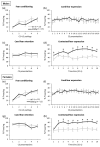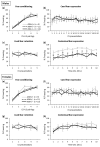Acid Sphingomyelinase Is a Modulator of Contextual Fear
- PMID: 35328819
- PMCID: PMC8954852
- DOI: 10.3390/ijms23063398
Acid Sphingomyelinase Is a Modulator of Contextual Fear
Abstract
Acid sphingomyelinase (ASM) regulates a variety of physiological processes and plays an important role in emotional behavior. The role of ASM in fear-related behavior has not been investigated so far. Using transgenic mice overexpressing ASM (ASMtg) and ASM deficient mice, we studied whether ASM regulates fear learning and expression of cued and contextual fear in a classical fear conditioning paradigm, a model used to investigate specific attributes of post-traumatic stress disorder (PTSD). We show that ASM does not affect fear learning as both ASMtg and ASM deficient mice display unaltered fear conditioning when compared to wild-type littermates. However, ASM regulates the expression of contextual fear in a sex-specific manner. While ASM overexpression enhances the expression of contextual fear in both male and female mice, ASM deficiency reduces the expression of contextual fear specifically in male mice. The expression of cued fear, however, is not regulated by ASM as ASMtg and ASM deficient mice display similar tone-elicited freezing levels. This study shows that ASM modulates the expression of contextual fear but not of cued fear in a sex-specific manner and adds a novel piece of information regarding the involvement of ASM in hippocampal-dependent aversive memory.
Keywords: ASM; PTSD; contextual fear; cued fear; fear conditioning; fear extinction; fear learning; knock-out mice; transgenic mice.
Conflict of interest statement
The authors declare no conflict of interest. The funders had no role in the design of the study; in the collection, analyses or interpretation of data; in the writing of the manuscript, or in the decision to publish the results.
Figures



References
-
- Schissel S.L., Jiang X., Tweedie-Hardman J., Jeong T., Camejo E.H., Najib J., Rapp J.H., Williams K.J., Tabas I. Secretory sphingomyelinase, a product of the acid sphingomyelinase gene, can hydrolyze atherogenic lipoproteins at neutral pH. Implications for atherosclerotic lesion development. J. Biol. Chem. 1998;273:2738–2746. doi: 10.1074/jbc.273.5.2738. - DOI - PubMed
MeSH terms
Substances
Grants and funding
LinkOut - more resources
Full Text Sources
Medical
Molecular Biology Databases

